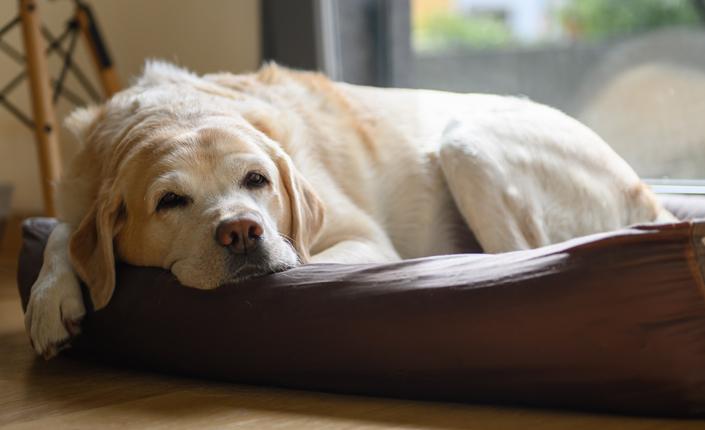
IS MY PET SICK, OR JUST SLEEPY?
Dogs and cats spend a large portion of each day sleeping. Dogs sleep about 10-14 hours per day. Meanwhile, cats log about two more hours of z’s, averaging 12-16 daily hours of sleep. Most pets spend an additional seven or eight hours awake but resting. Very young and very old pets will sleep even more!
Both dogs and cats are naturally crepuscular, meaning they are more active at dawn and dusk. They also enjoy polyphasic sleep, so they have many short sleep sessions rather than one long one. As a result, you can expect to see your pets sleeping a lot.
As you spend more time at home, you might wonder if your pets are sleeping a normal amount. Lethargy due to illness can look a lot like sleepiness. How can you tell if your pet is sick or just sleepy?
Have your pet’s sleep habits changed?
Pets that have always slept a lot and continue to do so are likely not sick. However, changes from standard patterns are worth an investigation. If your pet seems to be sleeping more than before or at different times during the day, it could be a sign of illness.
Have your pet’s other habits changed?
Pet monitoring cams and the work-from-home lifestyle have brought many people closer to their pets. Pet owners have a new window into their pets’ daytime routines. What if you’re worried that your pet sleeps too much, but you’re not sure if the amount or pattern of sleep has changed?
Ask yourself if any other behaviours or health indicators have changed. Is your pet’s social behaviour normal? Do they interact with you as they always have? Have they become withdrawn, or perhaps more clingy? Are they playful and active at times during the day? Do they have stamina during walks or playtime, and do they move around with ease? A healthy pet should embrace exercise and play. Pain and disease can cause pets to tire quickly or show reluctance to move. Some pets hide when they’re not feeling well, while others seek more attention than usual.
Other health indicators
Keep an eye on your pet’s appetite and bathroom habits. Are they eating or drinking any more or less than usual? Do they take longer to eat? Has the frequency of toilet breaks changed? Pets that have difficulty urinating or defecating or have accidents in the house may be sick. Likewise, any change in a pet’s interest in food is worth investigating.
Finally, think about your pet’s weight. Look at photos of your pet from three to six months ago and evaluate whether they’ve gained or lost any weight. Unintentional weight changes in a fully-grown pet could point to a health issue.
Regular vet visits
Young pets should see their veterinarian once or twice a year for regular checkups. Pets over seven or eight years of age should be evaluated more frequently. These checkups allow the vet to perform a thorough physical examination and tests to screen for silent disease. Since animals can’t tell us when they don’t feel quite right, these visits are crucial. If your pet is new to you, your vet can help you learn what to expect from your pet and their daily sleep habits.
It’s normal to sleep a bit more after a restless night, a busy weekend, or a long hike. If increased sleep lasts more than a day or is accompanied by changes in your pet’s other essential activities, a visit to the vet is prudent.
Written by: Dr. Sperry, DVM, Veterinary Advisor, Pets Plus Us
